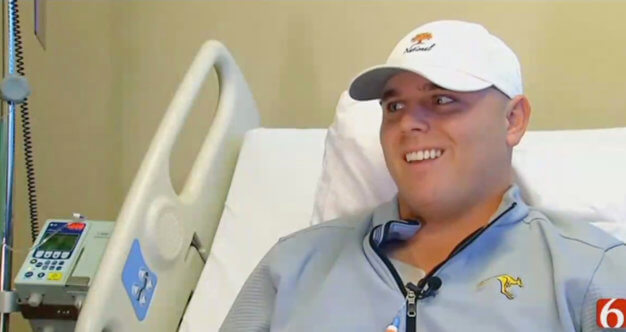A 23 year old college senior and golfer, Sam Humphreys, had a chance accident on the golf course, and ended up learning he has testicular cancer. Now he’s cancer free, and back on the University of Missouri at Kansas City course.
“I was hitting balls with my dad out on the range at National,” Sam said. “Basically, a club was on the ground, and I stepped on it.”
Read More“It actually hit me right in the tumor, and it was on the right testicle and it traumatized the tumor and gave me pain,” Sam said. “It was definitely like a God thing.”
There isn’t a recommended standard or routine testicular cancer test. Testicular tumors are usually found either when men examine themselves, or when doctors conduct examinations during physical appointments. Routine examination would likely help discover the disease and decrease the risk of dying from testicular cancer, though isn’t much research on the topic. Testicular cancer is usually curable when caught at any stage.
Testicular cancer is very rare, but it is the most common cancer found in men between the ages of 15 and 34. White men are four times more likely than black men to have testicular cancer.
The number of new cases of testicular cancer has doubled in the last 40 years, but the number of deaths caused by testicular cancer has decreased greatly because of better treatments. Testicular cancer can usually be cured, even in late stages of the disease.
Despite his diagnosis, Humphreys kept a positive attitude. “You don’t have to stop living when you have cancer; it’s just the cancer, you know,” he said. “So, I wake up with the ‘why’ of kind of trying to inspire positivity whether people are going through way harder things than me.”
Sam’s friends have sent him love in the form of cards, texts and social media posts. “My teammates too, they all wore purple ‘Sam Strong’ shirts in Chicago and it meant a lot,” Sam said. “Just having their support, I just miss them. My best friend Taylor too. Sounds weird but one of the good things about having cancer, people say things that like you normally don’t get to hear and sometimes they wait to say things and they never get to say to somebody. It means a lot.”
Staying true to his faith has helped too.
One thing he did have give up is playing fall golf with him team. But now that he’s been declared cancer free, he is back on the team, playing golf for University of Missouri, KC.
Learn more about SurvivorNet's rigorous medical review process.


